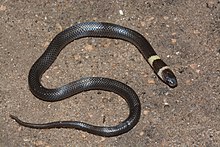Aparallactus guentheri, or the black centipede-eater, is a species of mildly venomous rear-fanged snake in the family Atractaspididae.[2] The species is endemic to Africa.
| Aparallactus guentheri | |
|---|---|

| |
| Scientific classification | |
| Domain: | Eukaryota |
| Kingdom: | Animalia |
| Phylum: | Chordata |
| Class: | Reptilia |
| Order: | Squamata |
| Suborder: | Serpentes |
| Family: | Atractaspididae |
| Genus: | Aparallactus |
| Species: | A. guentheri
|
| Binomial name | |
| Aparallactus guentheri | |
| Synonyms[1] | |
Etymology edit
The specific epithet, guentheri, is in honor of German-British herpetologist Albert Günther,[3] who preceded George Albert Boulenger at the British Museum (Natural History).
Distribution edit
A. guentheri is found in Angola, Kenya, Malawi, Mozambique, Tanzania (including Zanzibar), Zambia, and Zimbabwe.
Description edit
A. guentheri is blackish brown dorsally, a little lighter ventrally. The chin and throat are yellowish white. It has a deep black collar, edged with yellowish white in front and behind, narrowly interrupted on the throat.
Adults may attain a total length of 33 cm (13 in), with a tail 8 cm (3+1⁄8 in) long.
The portion of the rostral visible from above is nearly half as long as its distance from the frontal. The frontal is 1½ times as long as broad, much longer than its distance from the end of the snout, a little shorter than the parietals. The nasal is divided, in contact with the preocular. There is one postocular. There are seven upper labials, the third and fourth entering the eye, the fifth in contact with the parietal. The mental is in contact with the anterior chin shields, which are as long as and a little broader than the posterior chin shields. The anterior chin shields are in contact with four lower labials.
The dorsal scales are smooth, without pits, in 15 rows. The anal is entire. The subcaudals number 51–59, and are entire (undivided).[4]
References edit
- ^ a b Species Aparallactus guentheri at The Reptile Database www.reptile-database.org.
- ^ "Aparallactus ". Integrated Taxonomic Information System. Retrieved August 9, 2010.
- ^ Beolens, Bo; Watkins, Michael; Grayson, Michael (2011). The Eponym Dictionary of Reptiles. Baltimore: Johns Hopkins University Press. xiii + 296 pp. ISBN 978-1-4214-0135-5. (Aparallactus guentheri, p. 111).
- ^ Boulenger GA (1896). Catalogue of the Snakes in the British Museum (Natural History), Volume III., Containing the Colubridæ (Opisthoglyphæ and Proteroglyphæ) .... London: Trustees of the British Museum (Natural History). (Taylor and Francis, printers). xiv + 727 pp. + Plates I-XXV. (Aparallactus guentheri, p. 259 + Plate XI, figures 2, 2a, 2b).
Further reading edit
- Boulenger GA (1895). "Descriptions of Two new Snakes from Usumbara, German East Africa". Ann. Mag. Nat. Hist., Sixth Series 16: 171–173. (Aparallactus guentheri, new species, p. 172).
- Branch, Bill (2004). Field Guide to Snakes and other Reptiles of Southern Africa. Third Revised edition, Second impression. Sanibel Island, Florida: Ralph Curtis Books. 399 pp. ISBN 0-88359-042-5. (Aparallactus guentheri, p. 64 + Plate 26).
- Pietersen DW, Verburgt L, Davies JP (2021). Snakes and other Reptiles of Zambia and Malawi. Cape Town: Penguin Random House South Africa. 376 pp. ISBN 978-1775847373.
- Spawls S, Howell K, Hinkel H, Menegon M (2018). Field Guide to East African Reptiles, Second Edition. London: Bloomsbury Natural History. 624 pp. ISBN 978-1472935618. (Aparallactus guentheri, p. 452).